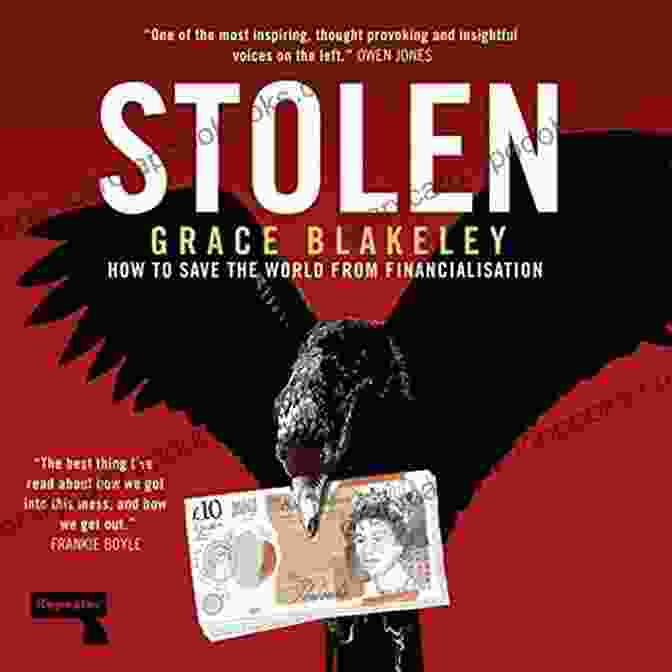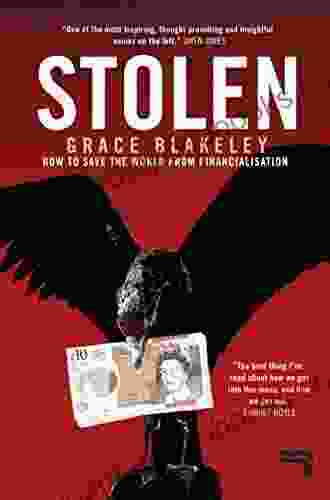Stolen: How to Save the World from Financialisation


In her groundbreaking new book, Stolen: How to Save the World from Financialisation, Grace Blakeley exposes the devastating impact of financialisation on our economy, society, and democracy. Financialisation, she argues, is a system in which the financial sector dominates the real economy, extracting wealth from productive activities and enriching a tiny elite at the expense of the majority.
4.5 out of 5
| Language | : | English |
| File size | : | 570 KB |
| Text-to-Speech | : | Enabled |
| Screen Reader | : | Supported |
| Enhanced typesetting | : | Enabled |
| Word Wise | : | Enabled |
| Print length | : | 321 pages |
Blakeley shows how financialisation has led to a decline in investment, productivity, and wages, while increasing inequality, poverty, and financial instability. She argues that this system is unsustainable and that we need to take urgent action to reclaim our economy and our democracy from the grip of finance.
The Impact of Financialisation
Financialisation has had a profound impact on the global economy. Since the 1980s, the financial sector has grown exponentially, while the real economy has stagnated. This has led to a decline in investment, productivity, and wages, while increasing inequality, poverty, and financial instability.
One of the most damaging effects of financialisation has been the decline in investment. In the 1970s, businesses invested an average of 15% of their profits back into their operations. Today, that number has fallen to just 5%. This decline in investment has led to a slowdown in economic growth and a decline in productivity.
Financialisation has also led to a sharp increase in inequality. The richest 1% of the population now owns more wealth than the bottom 99% combined. This inequality is not only unjust, but it is also economically inefficient. When the majority of people do not have enough money to spend, it stifles economic growth.
Financialisation has also made our economy more unstable. The financial crisis of 2008 showed us just how vulnerable our economy is to the excesses of the financial sector. When the housing bubble burst, it triggered a global financial crisis that led to a deep recession and widespread unemployment.
The Political Economy of Financialisation
Financialisation is not a natural or inevitable process. It is the result of deliberate policy choices made by governments and central banks. In the 1970s and 1980s, governments around the world implemented a series of policies that deregulated the financial sector and allowed banks to take on more risk. These policies were designed to promote economic growth, but they ultimately led to the financial crisis of 2008.
Since the financial crisis, governments have continued to implement policies that support financialisation. They have bailed out banks, provided them with cheap loans, and deregulated the financial sector even further. These policies have helped to prop up the financial sector, but they have also made our economy more vulnerable to another financial crisis.
The political economy of financialisation is complex, but it is clear that the financial sector has a disproportionate amount of power and influence in our economy and our democracy. Banks and other financial institutions have captured our political system and are using their power to promote policies that benefit them at the expense of the rest of us.
How to Save the World from Financialisation
Blakeley argues that we need to take urgent action to reclaim our economy and our democracy from the grip of finance. She proposes a number of policies that would help to reduce financialisation and create a more just and sustainable economy.
These policies include:
* Regulating the financial sector more effectively * Breaking up the big banks * Investing in the real economy * Raising wages and reducing inequality * Expanding social programs
These policies would not be easy to implement, but they are essential if we want to create a more just and sustainable economy. Blakeley's book provides a clear and concise roadmap for how we can reclaim our economy and our democracy from the grip of finance.
Stolen: How to Save the World from Financialisation is a must-read for anyone who wants to understand the challenges facing our economy and our democracy. Blakeley's book provides a clear and concise analysis of the problem of financialisation and offers a number of practical solutions for how we can reclaim our economy and our democracy.
4.5 out of 5
| Language | : | English |
| File size | : | 570 KB |
| Text-to-Speech | : | Enabled |
| Screen Reader | : | Supported |
| Enhanced typesetting | : | Enabled |
| Word Wise | : | Enabled |
| Print length | : | 321 pages |
Do you want to contribute by writing guest posts on this blog?
Please contact us and send us a resume of previous articles that you have written.
 Book
Book Novel
Novel Page
Page Chapter
Chapter Text
Text Story
Story Genre
Genre Reader
Reader Library
Library Paperback
Paperback E-book
E-book Magazine
Magazine Newspaper
Newspaper Paragraph
Paragraph Sentence
Sentence Bookmark
Bookmark Shelf
Shelf Glossary
Glossary Bibliography
Bibliography Foreword
Foreword Preface
Preface Synopsis
Synopsis Annotation
Annotation Footnote
Footnote Manuscript
Manuscript Scroll
Scroll Codex
Codex Tome
Tome Bestseller
Bestseller Classics
Classics Library card
Library card Narrative
Narrative Biography
Biography Autobiography
Autobiography Memoir
Memoir Reference
Reference Encyclopedia
Encyclopedia Bruno Vespa
Bruno Vespa Dan Jurgens
Dan Jurgens Bruce Maddy Weitzman
Bruce Maddy Weitzman Diana Kanecki
Diana Kanecki Yaasmyn Fula
Yaasmyn Fula Darren Ellwein
Darren Ellwein Janet Berliner
Janet Berliner Linda Benson
Linda Benson Max Ciampoli
Max Ciampoli Jake Shimabukuro
Jake Shimabukuro Ananya Vajpeyi
Ananya Vajpeyi Anat Admati
Anat Admati Jacqueline Leckie
Jacqueline Leckie Amory Morena
Amory Morena Amelia Wilde
Amelia Wilde Paul Den Arend
Paul Den Arend Bradford M Smith
Bradford M Smith Debra Newby
Debra Newby Miriam Neff
Miriam Neff Amy Zoellers
Amy Zoellers
Light bulbAdvertise smarter! Our strategic ad space ensures maximum exposure. Reserve your spot today!

 Zachary CoxDesignated Protector Amanda Abrom: A Thrilling and Inspiring Tale of Destiny...
Zachary CoxDesignated Protector Amanda Abrom: A Thrilling and Inspiring Tale of Destiny... Dallas TurnerFollow ·3.4k
Dallas TurnerFollow ·3.4k Chandler WardFollow ·18.7k
Chandler WardFollow ·18.7k Cody BlairFollow ·15.8k
Cody BlairFollow ·15.8k Peter CarterFollow ·2.8k
Peter CarterFollow ·2.8k Ross NelsonFollow ·2.9k
Ross NelsonFollow ·2.9k Luke BlairFollow ·17.1k
Luke BlairFollow ·17.1k Roland HayesFollow ·15.3k
Roland HayesFollow ·15.3k Neil ParkerFollow ·18k
Neil ParkerFollow ·18k

 Roald Dahl
Roald DahlImmerse Yourself in a Mesmerizing Tapestry of Creativity:...
Prepare to be captivated by "Spectra," an...

 Clarence Brooks
Clarence BrooksUnleash Your Inner Taylor with Red Piano Vocal Guitar:...
Embrace the Red Era...

 Jeffrey Hayes
Jeffrey HayesUnlock Your Child's Academic Potential: A Comprehensive...
In today's rapidly changing...

 William Golding
William GoldingBrave Elizabeth: A Captivating Tale of Resilience and...
Immerse Yourself in a Riveting Historical...

 Curtis Stewart
Curtis StewartUnveiling the Heartfelt Melodies of Taylor Swift: A...
Step into the enchanting world of Taylor...
4.5 out of 5
| Language | : | English |
| File size | : | 570 KB |
| Text-to-Speech | : | Enabled |
| Screen Reader | : | Supported |
| Enhanced typesetting | : | Enabled |
| Word Wise | : | Enabled |
| Print length | : | 321 pages |












